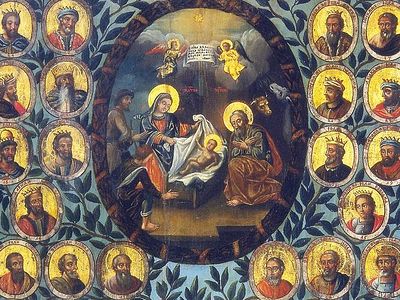Hidden well away in the Greek of  The Mysteries of Christ’s Genealogy All biblical names carry meaning and were predominantly inspired by prophecy. No translation can fully communicate the richness of the biblical names and the images they evoke.
The Mysteries of Christ’s Genealogy All biblical names carry meaning and were predominantly inspired by prophecy. No translation can fully communicate the richness of the biblical names and the images they evoke.
The genealogy with which St. Matthew opens his Gospel reveals a significant theological insight, one that is often lost in most English translations. Matthew starts his account by noting, “Abraham begot Isaac, and Isaac begot Jacob, and Jacob begot Judah and his brothers,” continuing with about forty more names. The term rendered as “begot” is the Greek ἐγέννησεν/ egennesen, from the verb γεννάω/ gennao, indicating an active conception. After several instances of one man actively begetting another, one might expect the climax to be “and Joseph begot Jesus.” However, that is not the conclusion.
Instead, it states, “Jacob begot Joseph, the husband of Mary, from whom was begotten Jesus”—in Greek rendered not as ἐγέννησεν but ἐγεννήθη/ egennethe, a passive voice instead of an active one. The shift from expected active verbs to the passive voice provides a profound psychological and grammatical surprise. The passive construction, after a long line of active verbs, mirrors the unexpected nature of the Messiah’s virgin birth.
The Jews of Second Temple Judaism did not anticipate a virgin-born Messiah. St. Matthew’s revelation regarding the Messianic significance of Isaiah 7:14 was divinely inspired, likely aided by the fact that Jesus indeed was born of a virgin. The concept of the Messiah’s virgin birth arose as an unexpected and startling truth.
The essential point is this: our God is inherent in the unexpected. This is reflected in the Hebrew Scriptures when they refer to Him as “the living God”—a God who acts freely, choosing His means of interaction with the world. He does not resemble the Deistic God who, after creation, merely observes how events unfold. The living God is active within our historical context. As the Psalmist states, “He does whatever He pleases in heaven or on earth” (Psalm 115:3), and much of what He does defies expectations.
This theme is abundantly illustrated in the life and ministry of Christ. Israel anticipated their Messiah to be a patriot and a hero, someone who would galvanize people, raise an army, and expel the Romans from Palestine, spilling their blood in the process. They expected Him to eliminate sin, war, and crime, establishing a Kingdom where good and evil would not coexist until the end of the age (see Matthew 13:24-30). They did not foresee Him to abstain from grand heroic speeches or to remain silent in the public square (see Matthew 12:15-21). They expected Him to wage war against the Romans, not to be executed by them in a humiliating fashion. Furthermore, they were unprepared for His radical transformation of Israel into a Church, transcending ethnic and national boundaries to welcome Gentiles into God’s people, making baptism and the Eucharist the new signs of belonging instead of circumcision and Sabbath. Every aspect of Christ’s ministry was both scandalous and utterly unforeseen.
Such unexpected revelations led many Jews to reject Him; they anticipated that the Messiah would fulfill their aspirations and nationalistic dreams, not diverge so profoundly from their expectations. While some accepted Him (such as the apostles), embracing the new perspectives He offered, others failed to do so. The difference between those who accepted and those who did not? Humility.
Some Jews who listened to Jesus were hardened by pride, which blinded them to His glory. In contrast, others demonstrated humility, accepting Christ’s teachings even when they required a complete reassessment of their beliefs. Thus, the unexpected nature of Christ’s ministry served to discern the proud from the humble. As Simeon the Righteous prophesied to the Mother of God upon seeing the Christ Child: “Behold, this child is set for the fall and rise of many in Israel” (Luke 2:34).
The Holy Prophet Malachi, who lived 400 years before Christ during the return of the Jews from Babylonian Captivity, remarked that the Messiah would act as a smelter (Malachi 3:3). This smelting process reflects our Lord’s surprising ministry, which separated the proud from the humble.
What implications does this hold for us today? It reveals that the God we serve is indeed a God of the unexpected. His responses may align with our hopes, or they may diverge dramatically. He might address our needs in ways we could never predict, yet the Apostle Paul reassures us that everything He does works together for our good (Romans 8:28). What is needed from us is humility—the capacity to embrace whatever comes from God with gratitude rather than rebellion.
All too often, we fall into the delusion that we are in control. In truth, we are perpetually under the mercy of God, unable to dictate our surroundings or, often, even our own actions. The path of wisdom encourages us to abandon this nonsensical belief and to express thanks for God’s merciful guidance in our lives. He remains the sovereign Lord, the One who acts according to His will, the God of the unexpected. In His care, we can find true peace.









